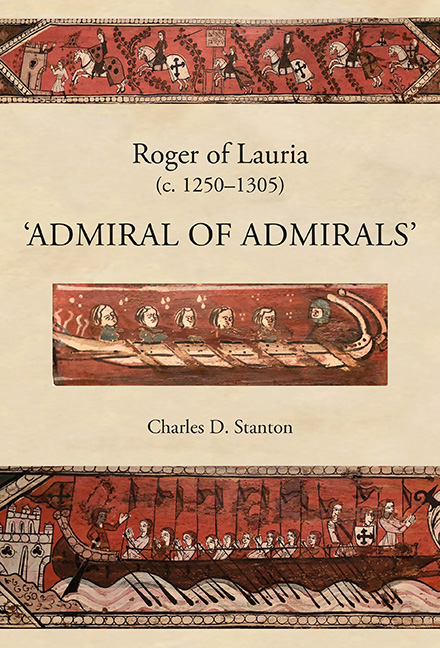Book contents
- Frontmatter
- Dedication
- Contents
- List of Illustrations
- Prologue
- 1 Battle of Benevento (26 February 1266)
- 2 A Calabrian Exile in the Court of Aragon (1262–1282)
- 3 Battle of Tagliacozzo (23 August 1268)
- 4 Aragonese Expansion (1229–1282)
- 5 Angevin Consolidation and Aggrandizement (1268–1282)
- 6 Revolt of the Vespers (30 March 1282)
- 7 Aragonese Intervention (August–October 1282)
- 8 Stalemate (November 1282–March 1283)
- 9 Admiral of Aragon (20 April 1283)
- 10 The Opposing Fleets (1282–1302)
- 11 Battle of Malta (8 June 1283)
- 12 Anjou's Dreams of Empire Dashed (June–November 1284)
- 13 France's Crusade Against Aragon (May–November 1285)
- 14 Battle of the Counts (23 June 1287)
- 15 Truces and Treaties (June 1287–November 1291)
- 16 Raid on Romania (Summer 1292)
- 17 Switching Sides (December 1293–April 1297)
- 18 Aragon's Invasion of Sicily at Anjou's Bidding (1298/1299)
- 19 Lauria's Last Great Campaign (Summer 1299–Spring 1300)
- 20 Endgame (Spring 1301–Summer 1302)
- Epilogue
- Bibliography
- Index
7 - Aragonese Intervention (August–October 1282)
Published online by Cambridge University Press: 24 October 2019
- Frontmatter
- Dedication
- Contents
- List of Illustrations
- Prologue
- 1 Battle of Benevento (26 February 1266)
- 2 A Calabrian Exile in the Court of Aragon (1262–1282)
- 3 Battle of Tagliacozzo (23 August 1268)
- 4 Aragonese Expansion (1229–1282)
- 5 Angevin Consolidation and Aggrandizement (1268–1282)
- 6 Revolt of the Vespers (30 March 1282)
- 7 Aragonese Intervention (August–October 1282)
- 8 Stalemate (November 1282–March 1283)
- 9 Admiral of Aragon (20 April 1283)
- 10 The Opposing Fleets (1282–1302)
- 11 Battle of Malta (8 June 1283)
- 12 Anjou's Dreams of Empire Dashed (June–November 1284)
- 13 France's Crusade Against Aragon (May–November 1285)
- 14 Battle of the Counts (23 June 1287)
- 15 Truces and Treaties (June 1287–November 1291)
- 16 Raid on Romania (Summer 1292)
- 17 Switching Sides (December 1293–April 1297)
- 18 Aragon's Invasion of Sicily at Anjou's Bidding (1298/1299)
- 19 Lauria's Last Great Campaign (Summer 1299–Spring 1300)
- 20 Endgame (Spring 1301–Summer 1302)
- Epilogue
- Bibliography
- Index
Summary
IN THE LATE SUMMER of 1282, while Charles of Anjou was conducting a constricting siege of Messina that would quite probably determine Sicily's fate, Peter of Aragon was struggling with a stubborn conundrum in Collo. He had positioned himself almost perfectly to intervene, but he could not do so unless he was invited. Otherwise he would be risking the appearance to the Sicilians and the rest of Europe of simply replacing one unwanted autocrat with another. Peter knew he was the solution to the Sicilian predicament; he just needed to convince the Sicilians of it.
Since arriving in Africa at the end of June, Peter had claimed a nearly deserted Collo and the adjacent coast, but he did not have the manpower to march on Constantina. He could only fortify his encampment and lead the occasional foray inland, while awaiting further developments on Sicily. In the meantime, incessant Saracen raids and the challenges of supplying and motivating a restive soldiery in an inimical environment proliferated. Eventually his counsellors, reportedly including Roger of Lauria, recommended that he dispatch an embassy to the pope, ostensibly to request ‘money and indulgences’ for the conquest of ‘Barbary’ for Christianity. But Michele Amari cites French sources to allege that this embassy, composed of Guillem de Castelnou and Pedro de Queralt, pulled into Palermo with their two galleys before ever reaching the papal palace at Montefiascone. Steven Runciman's reading of contemporary references led him to fundamentally concur, except that he believes that the Aragonese ambassadors met with the parliament of Palermo on the way back from Rome. No matter – the result was the same: Peter's request for papal support was rejected by Martin IV as he must have expected, but Castelnou's clandestine conference with the Sicilians in Palermo proved fruitful.
In truth, the Sicilians must have realized by this time that they had little choice in the matter – Anjou was literally at the gates of Messina with a huge army, even as the papacy adamantly refused its aegis. They soon dispatched a delegation to Collo that included two envoys from Palermo and three from Messina. They came in a pair of llenys sometime in mid-August.
- Type
- Chapter
- Information
- Roger of Lauria (c.1250–1305)‘Admiral of Admirals’, pp. 90 - 103Publisher: Boydell & BrewerPrint publication year: 2019

